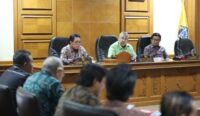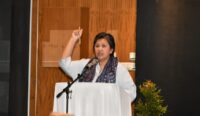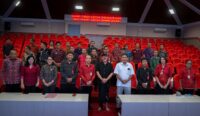Concludes Fifth International Conference on Oil Palm and Environment in Bali
The palm oil industry can adapt to climate change challenges; Stakeholders are encouraged to work together to support Indonesian smallholders
Bali (Metrobali.com) –
The fifth International Conference on Oil Palm and Environment (ICOPE) in 2016 concluded today with more than 400 delegates from 18 countries having discussed issues ranging from how to intensify oil palm production whilst minimising environmental impact, and how reducing greenhouse gas emissions from palm oil production can contribute to Indonesia’s COP21 targets.
Topics discussed during the three-day event included maintaining superior productivity through high-yielding planting materials, good agricultural practices and how the palm oil industry supports and engages smallholders in mitigating and adapting to climate change. Participants also discussed how to compare the calculated carbon footprint analysis and on how to reduce emissions from the oil palm industry based on ISPO, RSPO, and ISCC sustainable palm oil certification schemes.
Michel Eddi, the President Managing Director of CIRAD – the French Centre for International Cooperation in Agricultural Research for Development stated ”Thanks to the fruitful collaborative research between public and private stakeholders, the challenge is to limit the extension of oil palm plantations, through the sustainable intensification of productivity, the improved knowledge of key actors such as smallholders and the promotion of development strategies which are able to minimize negative impacts on the environment and natural biodiversity while improving the welfare of local people. The overall raising of the sector’s durability relies on the strengthening of principles and criteria leading to reliable sustainability standards which requires ongoing efforts on collaborative research.”
Stopping deforestation and planting on peat soils, capturing methane during effluent treatment, stopping slash and burn practice by famers are some of the key solutions discussed during ICOPE 2016. Optimising water management in peat areas already planted supported by tighter fire controls and community engagement is also seen as a critical factor in dealing with the El Nino and La Nina threats.
Closing the conference, Chairman of ICOPE 2016 Organizing Committe, JPCaliman said, “The technology to mitigate and adapt to climate change is available to help the palm oil industry. What is more important is how stakeholders in the sector collaborate to support our smallholders with the appropriate incentive, regulatory framework and technical assistance.”
“We are thankful to all the delegates, government officials, scientists, industry players especially smallholders, sponsors and exhibitors for coming together and sharing their thoughts and ideas about improving our palm oil industry. We aim to share the collective knowledge shared in the Conference through actionable solutions for all stakeholders in the palm oil sector,” said Caliman.
International Conference on Oil Palm and Environment (ICOPE) 2016 is a bi-annual international conference dedicated as a sientific platform for the development of sustainable palm oil to meet the environmental challenges.
ICOPE is carried out by the collaboration between PT SMART Tbk, World Wildlife Fund (WWF) Indonesia, and CIRAD France. The next ICOPE is scheduled to take place in 2018. RED-MB













Tinggalkan Balasan
Anda harus masuk untuk berkomentar.